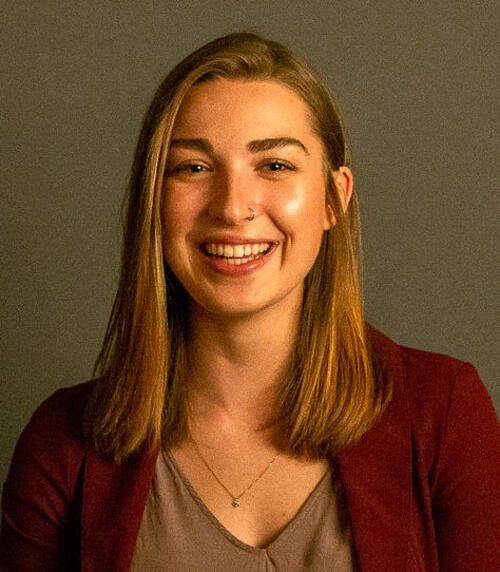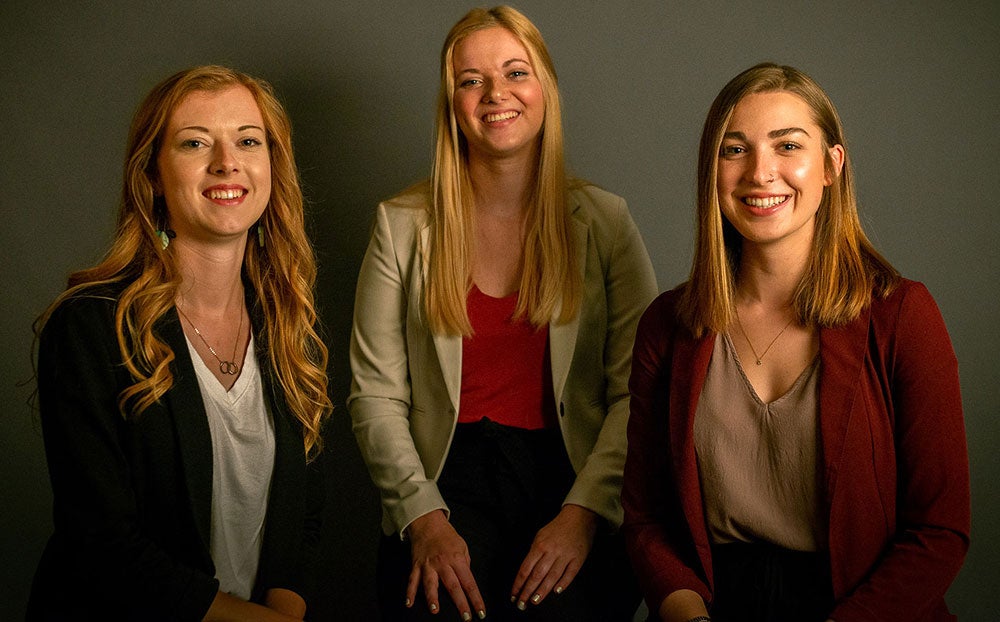
Breaking the cycle of poverty
SheCycle keeps girls healthy and in school with a sanitary pad

SheCycle keeps girls healthy and in school with a sanitary pad
By Emma Johnston University Relations
Anna Kuepfer
Student, Faculty of Applied Health Sciences
> Co-founder, SheCycle
> Greenhouse at St. Paul’s University College
> Concept Science
Mattress foam, dried leaves and newspaper are hardly the first items that come to mind when people in developed countries think of menstrual hygiene products, and yet for many women and girls in Uganda, the use of such elements during menstruation is common practice.
Despite menstruation being a natural aspect of human life, at least 500 million women globally still lack adequate facilities for menstrual hygiene management. Many countries continue to harbour an intense cultural stigma towards the process, and girls are left without proper education or resources to manage their cycles.
“It’s such a simple issue but a really complex problem,” says Anna Kuepfer, an undergraduate student at the University of Waterloo. While on a volunteer trip to Uganda in 2017, she witnessed the effects of poor menstrual hygiene first-hand, and observed the often-devastating impact it has on the health, education and quality of life for women in the central African country.
“Menstrual hygiene is such a large determining factor for a girl’s trajectory in life,” Kuepfer explains. “If she’s missing school because of her period, it can lower her level of education and lead to earlier pregnancy, in addition to all of the other health risks that infections are causing.”
To combat harmful infections and support women as active participants in society, Kuepfer and her co-founders, Abigail Loewen and Leah Wouda, have formed SheCycle, a socially-minded company that distributes reusable, antimicrobial-coated pads that protect against bacterial infections.

SheCycle founders: Leah Wouda, Abigail Loewen and Anna Kuepfer
“A social enterprise has been seen in developing countries to be much more effective in the long run, as it’s reliable and you can eventually scale,” Loewen explains. “That’s what sets us apart.”
With their culturally sensitive and sustainable business model, they hope to intervene at critical points in a woman’s life — providing supplies and knowledge to young girls before their first menstrual cycle. They will employ local women to manufacture and distribute the pads in their villages. “We want to provide them with the ability to make an income and contribute economically within their community,” Kuepfer says.
“The women there would also help create the menstrual health education curriculum so that it’s appropriate to Ugandan culture,” says Wouda, a Waterloo student studying international development. “We want to work with the community to create a product and strategy that makes sense for them.”
The idea for SheCycle began when Kuepfer first returned home from Uganda and sought out St. Paul’s Greenhouse in an attempt to start developing a solution to the problems she had witnessed. She credits the social impact incubator for the problem validation and sustainable, design-based mindset that helped the idea take shape.
The team has additional ties to the Kindred Credit Union Centre for Peace Advancement, where they were first mentored and their original idea was born.
Apart from pitching, the team is currently busy developing their product. They are looking forward to engaging with advisors in the new Concept Science lab, who they hope can offer new perspectives on their product and business model.
Having won the World’s Challenge Challenge grand prize of $30,000 this past June, they have high hopes for their company, and for the future of menstrual health management in Uganda.
“We have found that a lot of communities have the ability to create a change for themselves if they’re given the right resources,” Wouda says. “The fact that we have been given the right resources, and that we have the ability to create something out of that and make an impact has been meaningful.”
The women have partnered with a school in Uganda for their pilot project. Kuepfer volunteered at the school during her time in Uganda, and is thrilled that the students she knows will be impacted by SheCycle’s efforts.
“The product is something that people recognize as valuable and it’s a need that people have,” Kuepfer says. “It is incredibly powerful for me to realize that I know the people that will have a different life, or have just a few more tools to succeed in life, because of what we’re doing.”

Read more
From rural India to Waterloo: how a woman's fearless pursuit of higher education led to an engineering professorship in Canada

Read more
Startup founded at Waterloo is one of Canada’s fastest growing tech companies for innovating digital mapping

Read more
Waterloo alumnus is working to better understand how global communities can own food security innovations
The University of Waterloo acknowledges that much of our work takes place on the traditional territory of the Neutral, Anishinaabeg, and Haudenosaunee peoples. Our main campus is situated on the Haldimand Tract, the land granted to the Six Nations that includes six miles on each side of the Grand River. Our active work toward reconciliation takes place across our campuses through research, learning, teaching, and community building, and is co-ordinated within the Office of Indigenous Relations.